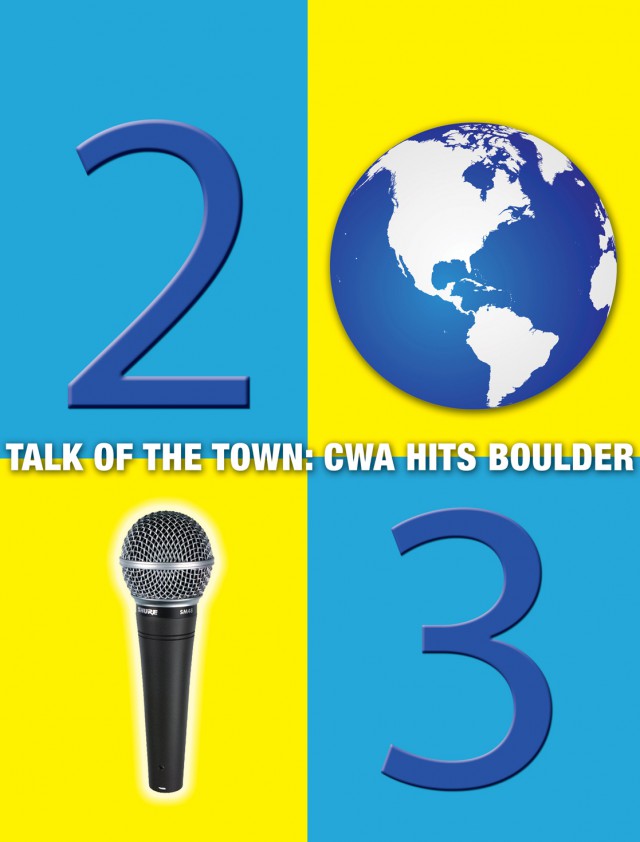
As far as — well, academic isn’t the right word — intellectually minded events go, the Conference on World Affairs (CWA) is pretty chaotic.
After all, the conference is basically one giant grab bag. More than 100 intellectuals and experts in their fields descend on Boulder to partake in panel discussions. The only hint to the subject matter is the title of the panel. Except the panels aren’t named until a few weeks before the conference, and the panelists often have little connection to one another, making for a spontaneous and lively meeting of the minds.
“This isn’t an academic conference,” says conference Director Jim Palmer, also a professor in the film studies department. “This is about the play of minds and ideas. That’s why it’s exciting.”
It’s a milestone year for the conference, and it’s a milestone year for Palmer, too, his 15th year leading the festival. His first experience with the festival was way back in 1966, when he was not yet a tenured professor but working on a contract basis. The keynote speech was “Ralph Nader On Cars,” Palmer says with a laugh.
The conference is more than just high-powered private sector careerists and public intellectuals. It offers live music, storytelling, film, multimedia presentations and more. This year’s conference, as is long-standing tradition, will host a jazz concert featuring long-time conference participants Dave Grusin and Don Grusin, joined by eight other jazz musicians. Another tradition, the cinema interruptus, for which Roger Ebert served as host and crowd-wrangler for more than 30 years, continues this year with One Flew Over the Cuckoo’s Nest. Tony Award-winning playwright and longtime conference participant Terrence McNally will lead the interruptus this year.
The main stages of this year’s conference will be occupied by people with long histories in politics and journalism. Former CIA spy Valerie Plame Wilson will give a talk called “My Life as a Spy, My Betrayal by the White House” on Thursday, April 11. Columnist Robert Novak outed Plame as a spy after her husband, longtime diplomat Joseph Wilson, wrote a series of op-eds questioning the rationale for the 2003 invasion in Iraq. Plame, whose work involved nuclear nonproliferation while with the CIA, will also give a lecture with Joe Cirincione, president of global security foundation Plowshares Fund, titled “Nuclear Nightmares.” (Another panel, “India, Pakistan, Kashmir: The Forgotten Nuclear Hot Spots,” will also deal with nuclear issues). David Orr, a distinguished professor of environmental studies at Oberlin College, will give a talk titled “Security and Resilience in a Black Swan World.” Rep. Kyrsten Sinema, D-Arizona, will talk on an immigration-related panel as well as give a speech called “Bipartisanship, Civility and Dialogue” on Monday, April 8. On Friday, April 12, David Corn, the Washington bureau chief for Mother Jones magazine, will speak at the Molly Ivins Freedom Fightin’ Memorial Plenary. Corn is best known for leaking the video of then-presidential hopeful Mitt Romney giving a speech in front of wealthy donors, calling the 47 percent of the country that doesn’t pay income taxes “dependent on government” and “entitled” to government handouts. Many believe the video was the final nail in the Romney campaign’s coffin.
A wide variety of topics get addressed during the conference, including psychology, world affairs, economics, food politics, environmental issues, defense, foreign policy and more. A panel of musicians and storytellers will discuss “Music That Changed My Life”; another panel will discuss “Tweeting for Freedom and Frivolity.” There is a panel on Barack Obama’s foreign policy and one reviewing his “second” first 100 days in office; a series of panels on privacy; a panel on dreams; a panel on vampires; a panel on too-big-to-jail bankers; a pair of panels where conservatives give advice to liberals and vice-versa; and many more.
The conference is the product of a small staff and hundreds of volunteers, including many students. A series of different committees composed of staff and volunteers invite the 100-plus attendees to the conference and then arrange housing for them. The attendees submit lists of topics in which they have expertise, and from those lists, a committee will group attendees by topics and form panels around them.
The festival’s tagline is “bringing the world to Boulder,” Palmer says, and that guides whom conference organizers invite. The focus is on getting people from outside Colorado, Palmer says, and keeping the conference agenda-free.
“We also don’t have politicians who are running for office. … We’re not a platform for launching political careers and campaigns,” Palmer says. “But we do have politicians who are in office who come and speak to us. We do have a lot of government officials, like ambassadors, people who are in [non-governmental organizations], lots of people from Washington.”
It’s no easy task getting people to fly to Boulder on their own dime and spend a week giving talks, Palmer says. But thankfully, the most effective recruiters for future conference speakers are the attendees themselves.
“I don’t make cold calls over the phone to tell them they need to spend their own money to come out here,” Palmer says. “It’s other participants who recruit for us. People who our participants think would be terrific new people for the conference. … There really is nothing like the Conference on World Affairs, and new participants tell me this all the time.”
Respond: [email protected]














